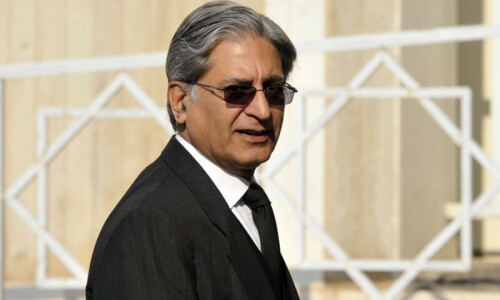‘POLITICAL engineering’ in Pakistan has, over the decades, taken many forms.
In recent times, these include causing defections in political parties through pressures, blackmail, and inducements; creating destabilisation through prolonged ‘sit-ins’; manufacturing media discourse in favour of or against certain political parties or political leaders; arbitrarily using disqualification provisions to remove politicians from the electoral process; and selectively applying accountability laws for — in the words of the Supreme Court — “oppression and victimisation” of opponents.
This year, a new variant in “political engineering” seems to have emerged: politicians are either abducted or arrested, their fate or whereabouts remain unknown for days or weeks, and finally, they make an appearance in press conferences or television interviews where they announce leaving the PTI and make a number of allegations against PTI’s chairperson.
These ‘disappearances’ — and later ‘reappearances’ — are not isolated events, but seem to be systematic and targeted against the political leadership of only one political party and its allies.
This suggests that the state is now using enforced disappearances as a tool to weaken the PTI by forcing defections and desertions from the party, as well as using incriminating statements against the PTI’s chairperson by such people shortly after their ‘reappearance’ as an attempt to change his public perception through the media.
The ‘disappearances’ — and later ‘reappearances’ — are not isolated events.
We should recall that under international law, an enforced disappearance is the “arrest, detention, abduction or any other form of deprivation of liberty by agents of the state … followed by a refusal to acknowledge the deprivation of liberty or by concealment of the fate or whereabouts of the disappeared person, which place such a person outside the protection of the law”.
It is also important to note that merely acknowledging arrest does not mean that a case is not one of an enforced disappearance — keeping the fate or the whereabouts of the detainee secret after the arrest, even if it is for a few days or weeks, is sufficient to make the practice a disappearance as it places the person outside the protection of the law.
UN experts have, therefore, called enforced disappearance “a tool for repression” and a “technique of terror”. They have expressed concern that in a number of countries, it is being taught to intelligence and security officers as a response to legitimate civil strife demanding democracy and other fundamental rights.
Historically, the practice of ‘enforced disappearances’ has taken many forms in Pakistan: while there are reports that enforced disappearance has been perpetrated since at least the 1970s, such cases have been recorded in significant numbers in the early 2000s, beginning with Pakistan’s involvement in the US-led ‘war on terror’ in late 2001.
Since then, hundreds of people accused of offences related to terrorism have reportedly been ‘disappeared’ after being abducted by security agencies and detained in secret facilities, particularly in Khyber Pakhtunkhwa.
Cases of enforced disappearances are also reported in large numbers in Balochistan, where the practice is used against political activists, human rights defenders and people who are considered ‘sympathetic’ to separatist or nationalist movements in the province, as well as in Sindh, where political activists have largely been targeted.
We have also seen a number of disappearances — mostly, but not exclusively, ‘short-term disappearances’ — across the country, where the victims include bloggers, activists, reporters, and others who are seen to be critical of the state. After apparently being interrogated in secret detention for days or weeks and reportedly being subjected to torture and other forms of ill treatment, they are released without being charged with any offence.
‘Short-term disappearances’ are a relatively new form of enforced disappearances. In 2015, responding to a case alleging enforced disappearance before the UN Human Rights Committee, committee member Olivier de Frouville pointed towards the evolution of enforced disappearance since the turn of the century.
He noted nowadays, “short-term disappearances have proliferated”, where victims are placed outside the protection of the law in secret detention before being released weeks or months later, sometimes after having been tortured and without having been brought in front of a judge.
This description captures what a number of political leaders from the PTI and its allies have been subjected to in recent months. The fact that they ‘reappear’ or ‘return’ after remaining ‘missing’ does not mean these cases can be downplayed or treated as just another form of arbitrary detention.
As courts in Pakistan have recognised, to be completely cut off from the outside world and be placed beyond the protection of the law has a particularly devastating impact on a person’s right to security, dignity, and well-being, and it is also a form of anguish for their families.
This makes the act a serious crime, ie, an enforced disappearance. It also raises questions about the veracity of the statements made by those who have been subjected to disappearances when they make a ‘reappearance’, and the extent of free will behind their decisions to leave the PTI.
Yet, just like there has been no accountability for those who repeatedly engage in political engineering in violation of the Constitution and their oaths despite a number of Supreme Court judgements denouncing such transgressions, impunity for serious human rights violations such as enforced disappearances has also become endemic, entrenched, and institutionalised in Pakistan.
Together, such impunity has created an environment of insecurity and uncertainty, weakened political parties, manipulated electoral outcomes, and emboldened the perpetrators of these violations, who continue to wreak havoc with constitutionalism, democracy, and the rule of law in the country without any real consequences.
The writer is a legal adviser for the International Commission of Jurists.
X (formerly Twitter): reema_omer
Published in Dawn, October 26th, 2023














































Dear visitor, the comments section is undergoing an overhaul and will return soon.